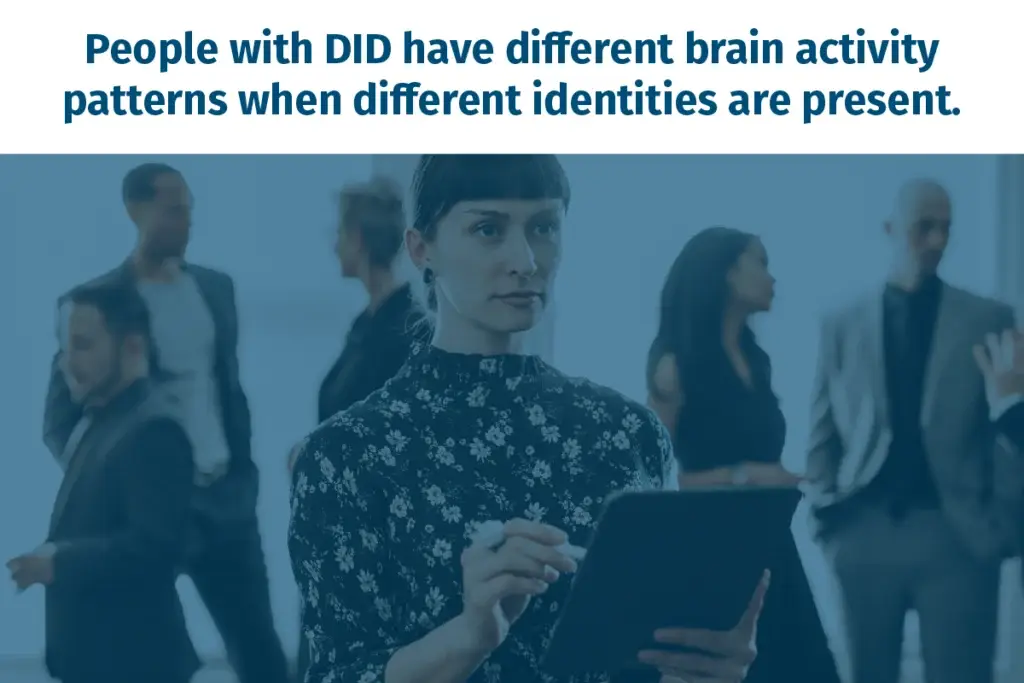Can Drugs Cause Dissociative Identity Disorder?
More Resources
Call us today to get the support and guidance you deserve.
Understanding Dissociative Identity Disorder
Dissociative identity disorder (DID), characterized by the presence of two or more distinct personality states, has long intrigued researchers and the public alike. While its origins are complex and multifaceted, a question that often arises is whether drugs can induce or exacerbate this condition.
This inquiry delves into the interplay between substance abuse and DID, exploring the potential causal relationship and the underlying mechanisms. Understanding the intricate interplay between substance use and mental health is crucial for effective intervention and support for individuals experiencing dissociative symptoms.
Key Takeaways
Individuals with DID may be more vulnerable to substance abuse as a way to cope with their symptoms or traumatic memories. Here’s what you need to know:
- Dissociative identity disorder involves the presence of two or more distinct personality states within an individual.
- Trauma is often a central factor in the development of dissociative identity disorder.
- No evidence directly links drug use to causing DID, but drugs can exacerbate symptoms in those already predisposed.
The Psychological Perspective
From a psychological perspective, DID is a complex response to severe stress and trauma. The mind creates different identities to cope with the overwhelming experiences. These separate identities help the person to categorize and manage their pain.
Therapists often use talk therapy to help people with DID. In therapy, individuals can work through their traumatic memories and integrate their identities into one cohesive self. This process can take a long time and requires a supportive and understanding therapeutic environment. The goal is to help the person regain control over their life and reduce the distress caused by the disorder.
The Neurological Perspective
Neurologically, DID involves changes in how the brain functions. Studies using brain imaging techniques show that people with DID have different brain activity patterns when different identities are present. Certain brain areas may become more or less active depending on the identity that is in control. Researchers believe these changes help the brain manage trauma by separating painful memories from everyday awareness. Understanding these brain patterns can help scientists develop better treatments.
Most insurance plans cover treatment here, making the cost to you as low as possible - sometimes even zero.






Role Of Drugs In Mental Health
Drugs play a big role in mental health. Doctors use them to treat many mental illnesses. These drugs help balance chemicals in the brain. When the brain chemicals are balanced, people feel better and can think more clearly.
There are different drugs for different mental health problems. For example, some drugs help with depression, while others help with anxiety or psychosis. Taking the right drug can make a huge difference in someone’s life. It can help them live normally and do everyday activities.
Types Of Psychoactive Drugs
Psychoactive drugs affect the mind. They change how we think, feel, and behave. There are several types of these drugs. Depressants, like alcohol and sleeping pills, slow down the brain. Stimulants, like caffeine and cocaine, make the brain more active.
Hallucinogens, like LSD and magic mushrooms, change how we see and hear things. Opioids, like painkillers and heroin, can relieve pain but are very addictive. Each type of drug affects the brain in different ways. Some are used as medicines, while others are illegal and harmful.
The Impact Of Substance Abuse
Substance abuse happens when people use drugs too much or in the wrong way. This can lead to many problems. People might get addicted, which means they can’t stop using the drug. Addiction can ruin lives. It can cause health issues, like heart disease or liver damage.
Substance abuse also affects families and friends. Relationships can suffer because of the person’s drug use. Jobs and schoolwork can be affected, too. People might lose their jobs or drop out of school. Substance abuse can also lead to legal troubles. It’s important to get help if someone is abusing drugs. Treatment can help them recover and lead a healthy life.
The Connection Between Drug Use and Dissociative Identity Disorder
Dissociative Identity Disorder (DID) is primarily caused by severe trauma, not drug use. However, certain substances can trigger dissociative symptoms that mimic aspects of DID. Hallucinogens, stimulants, and depressants can alter perception, cause memory disruptions, or lead to episodes of detachment from reality. While these effects are often temporary, prolonged substance use can make underlying dissociative tendencies more apparent, especially in individuals with a history of trauma.

Dissociative Identity Disorder (DID) is primarily caused by severe trauma, not drug use. However, certain substances can trigger dissociative symptoms that mimic aspects of DID. Hallucinogens, stimulants, and depressants can alter perception, cause memory disruptions, or lead to episodes of detachment from reality. While these effects are often temporary, prolonged substance use can make underlying dissociative tendencies more apparent, especially in individuals with a history of trauma.
Substances like LSD and psilocybin alter the brain’s perception of reality, leading to vivid hallucinations and dream-like experiences. Users may feel disconnected from their surroundings or even their own bodies, triggering intense dissociation. While some seek these experiences recreationally, they can be unsettling and may worsen dissociative symptoms, particularly in individuals with a history of trauma. Prolonged use can lead to persistent perception disturbances and difficulty distinguishing reality from hallucination.
Drugs such as cocaine and methamphetamine stimulate the central nervous system, increasing energy and alertness. However, high doses or prolonged use can lead to paranoia, hallucinations, and psychotic symptoms. These effects can cause a person to feel detached from their thoughts, emotions, or even reality itself. Stimulants can exacerbate underlying mental health issues, including dissociative symptoms, making it harder for individuals to maintain emotional and psychological stability.
Alcohol and benzodiazepines slow brain activity, producing a sedative effect. In high amounts, these substances can cause blackouts, memory lapses, and gaps in awareness. This can mimic dissociative amnesia, where individuals struggle to recall events that occurred while under the influence. Chronic use of depressants can interfere with cognitive function, leading to long-term difficulties with memory and emotional regulation.
While both drug-induced dissociation and DID involve altered perception and detachment, key differences exist:
Drug-induced dissociation occurs shortly after substance use and lasts from hours to days, whereas DID develops gradually, often beginning in childhood and persisting long-term.
Drug-induced dissociation involves temporary detachment, while DID is marked by distinct identities controlling behavior at different times.
Diagnosing DID can be complicated, especially when substance use is involved, as symptoms can overlap. Mental health professionals use structured assessments to differentiate DID from drug-induced dissociation by evaluating identity disruptions, memory gaps, and trauma history.
Stopping substance use, therapy, and support groups help restore stability. Eliminating the drug responsible for dissociation allows the brain to regain normal functioning, reducing symptoms over time. Therapy, such as Cognitive Behavioral Therapy (CBT), helps individuals understand their triggers, develop healthier coping mechanisms, and rebuild a sense of connection to reality. Support groups provide a network of individuals who have faced similar struggles, offering encouragement and accountability throughout the recovery process.
Trauma-focused therapy aims to integrate identities, process past trauma, and develop coping strategies. Since DID is rooted in severe trauma, therapy focuses on creating safety and stability before addressing past experiences. Treatments like Eye Movement Desensitization and Reprocessing (EMDR) and Internal Family Systems (IFS) therapy help individuals process traumatic memories while fostering communication and cooperation between different identities. Long-term treatment emphasizes emotional regulation, self-awareness, and strategies to manage dissociative episodes, improving overall mental health and daily functioning.
Build Resilience With The Recovery Team
Navigating the journey to recovery can bring up many questions. Below are some of the most commonly asked questions about our services. If you need more information or have additional questions, we are only a phone call away.

Certain psychoactive substances, when abused or misused, can induce severe forms of dissociation, a type of dissociative disorder. This can lead to life-threatening disturbances and cause split personalities. Traumatic events, health conditions, or genetic predispositions may also play a role. Family members of individuals experiencing these symptoms should seek immediate help from healthcare professionals. It’s crucial to address these issues promptly to ensure the safety and well-being of the affected individual and their loved ones.
Childhood trauma and traumatic experiences, including sexual abuse and natural disasters, are major causes of dissociative identity disorder (DID). Symptoms include memory loss, dissociative fugue, and a fragmented sense of self. Mental health professionals diagnose and treat DID, often addressing co-occurring conditions like posttraumatic stress disorder and substance use disorders.
Treatment options may include therapy and medication. Seeking professional medical advice is crucial for individuals experiencing symptoms of dissociative disorders.
Certain recreational drugs, especially hallucinogens like ketamine and PCP, are more likely to induce dissociative symptoms. These symptoms can resemble dissociative disorders seen in medical conditions such as posttraumatic stress disorder or dissociative amnesia.
Those with a history of drug addiction, physical abuse, or mental health disorders are at heightened risk. Seeking information from medical professionals or healthcare providers is crucial, as severe forms of dissociation can be life-threatening. The American Psychiatric Association and medical providers offer resources for managing dissociative symptoms related to drug abuse.
Give us a 5-minute call for more information about our services. There is no commitment or judgement – we’ve been there before ourselves.
Contact us for more information :
Call Us
(800) 817-1247
Verify Insurance
100% Confidential
